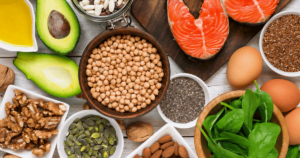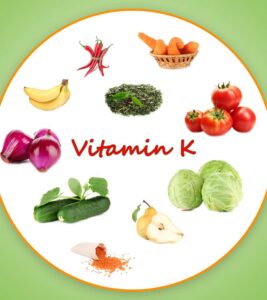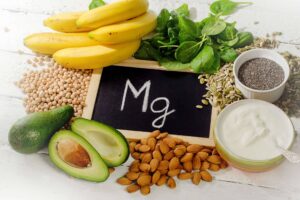Menopause, a natural biological process marking the end of a woman’s reproductive years, brings about various changes in the body. From hormonal fluctuations to the onset of symptoms like hot flashes and mood swings, navigating through menopause can be challenging. However, one key aspect often overlooked is the role of nutrition, specifically vitamins, in managing these changes. In this article, we delve into the world of vitamins for menopause, exploring their benefits, sources, and overall impact on women’s health.
Contents
Understanding Menopause
As women age, the ovaries produce fewer hormones, particularly estrogen and progesterone. This decline in hormonal levels leads to the onset of menopause.
Menopause is characterized by erratic hormonal fluctuations, contributing to a range of physical and emotional symptoms.
Hot flashes, mood swings, insomnia, and changes in skin and hair are among the common symptoms women experience during menopause.
What Vitamin Deficiencies Occur During Menopause?

During menopause, women may be more prone to certain vitamin deficiencies. Here are some key points regarding vitamin deficiencies that can occur during menopause:
Vitamin D:
- Reduced sunlight exposure and aging skin can lead to decreased vitamin D synthesis.
- Vitamin D deficiency is common and is associated with bone health, mood, and immune function.
Calcium:
- Estrogen decline during menopause may affect calcium absorption and utilization.
- Calcium is crucial for bone health, and deficiencies can contribute to osteoporosis.
Vitamin B12:
- Absorption of vitamin B12 may be impaired, possibly due to changes in stomach acid production.
- B12 is important for nerve function and the production of red blood cells.
Vitamin E:
- Hormonal changes can impact vitamin E levels.
- Vitamin E has antioxidant properties and is important for skin health.
Magnesium:
- Hormonal shifts may influence magnesium levels.
- Magnesium is vital for muscle function, bone health, and cardiovascular health.
Vitamin K:
- Fluctuations in estrogen levels may affect vitamin K metabolism.
- Vitamin K is essential for bone health and blood clotting.
Different Vitamins for Menopause
It’s important to note that individual needs can vary, and it’s advisable to consult with a healthcare professional before adding new supplements to your routine.
Here are some vitamins for menopause:
Vitamin D
Vitamin D is a fat-soluble vitamin that plays a crucial role in several important functions within the body. One of its primary functions is to help the body absorb calcium, promoting bone health. Here are some key aspects of vitamin D:
Functions of Vitamin D:
- Calcium Absorption: Vitamin D enhances the absorption of calcium in the small intestine, promoting strong and healthy bones.
- Bone Health: Vitamin D is essential for maintaining proper bone density and preventing conditions like osteoporosis and rickets.
- Immune System Support: Vitamin D is believed to play a role in supporting the immune system, helping the body defend against infections and diseases.
Sources of Vitamin D:
- Sunlight: The skin can produce vitamin D when exposed to sunlight. Spending time outdoors, especially during midday, allows the body to synthesize vitamin D.
Dietary Sources:
- Fatty Fish: Salmon, mackerel, tuna, and sardines are good sources.
- Cod Liver Oil: A concentrated source of vitamin D.
- Egg Yolks: Eggs contain small amounts of vitamin D.
- Fortified Foods: Some foods, such as dairy products, orange juice, and cereals, may be fortified with vitamin D.
Vitamin K

Vitamin K is a fat-soluble vitamin for menopause that plays a crucial role in various physiological processes, particularly in blood clotting and bone metabolism. There are two main forms of vitamin K: K1 (phylloquinone) and K2 (menaquinone). Here are the key aspects of vitamin K:
Functions of Vitamin K:
- Blood Clotting: Vitamin K is essential for the synthesis of proteins involved in blood clotting. These proteins help in the formation of blood clots to prevent excessive bleeding when injuries occur.
- Bone Health: Vitamin K is involved in bone metabolism and helps regulate calcium within bones and blood vessels. It contributes to bone mineralization and may reduce the risk of fractures.
- Cellular Functions: Vitamin K is involved in various cellular processes, including cell growth, survival, and apoptosis (programmed cell death).
Sources of Vitamin K:
- Leafy Green Vegetables: Kale, spinach, collard greens, Swiss chard, broccoli, and Brussels sprouts.
- Vegetable Oils: Soybean oil, canola oil, and olive oil.
- Fish: Certain fish, such as salmon and tuna, contain small amounts of vitamin K.
- Meat and Dairy: Meat, eggs, and dairy products contribute to vitamin K intake.
- Fermented Foods: Certain fermented foods, like natto (a Japanese dish made from fermented soybeans), can be rich in vitamin K2.
Vitamin E
Vitamin E is a fat-soluble antioxidant that plays a vital role in protecting cells from oxidative damage. It exists in several forms, with alpha-tocopherol being the most biologically active. Here are the key aspects of vitamin E:
Functions of Vitamin E:
Antioxidant Protection:
- Role: Vitamin E is a powerful antioxidant that helps neutralize free radicals in the body. Free radicals are unstable molecules that can damage cells and contribute to various chronic diseases and aging.
Immune System Support:
- Role: Vitamin E supports the immune system by protecting immune cells from oxidative stress.
Skin Health:
- Role: Vitamin E is known for its role in promoting skin health. It can help protect the skin from UV damage and assist in wound healing.
Heart Health:
- Role: Some studies suggest that vitamin E may have a protective effect on cardiovascular health by preventing the oxidation of LDL cholesterol.
Eye Health:
- Role: Vitamin E may contribute to eye health by protecting the cells of the eyes from oxidative damage.
Sources of Vitamin E:
Nuts and Seeds:
- Rich Sources: Almonds, sunflower seeds, hazelnuts, and pine nuts.
Vegetable Oils:
- Sources: Sunflower oil, wheat germ oil, safflower oil, and olive oil.
Green Leafy Vegetables:
- Sources: Spinach, kale, Swiss chard, and turnip greens.
Fortified Foods:
- Sources: Some breakfast cereals and other food products may be fortified with vitamin E.
Fruits:
- Sources: Kiwi, mango, and blackberries.
Vitamin C

Vitamin C, also known as ascorbic acid, is a water-soluble vitamin that plays a crucial role in various bodily functions. It is well-known for its antioxidant properties and its role in supporting the immune system. Here are the key aspects of vitamin C:
Functions of Vitamin C:
Antioxidant Protection:
- Role: Vitamin C is a potent antioxidant that helps protect cells from oxidative stress caused by free radicals. It neutralizes free radicals, preventing damage to DNA, proteins, and lipids.
Collagen Synthesis:
- Role: Vitamin C is essential for the synthesis of collagen, a structural protein that plays a key role in the formation of skin, blood vessels, bones, and connective tissues.
Immune System Support:
- Role: Vitamin C supports the immune system by promoting the production and function of white blood cells, which help the body fight infections.
Wound Healing:
- Role: Vitamin C is involved in the healing of wounds and the repair of tissues. It plays a crucial role in the formation of scar tissue.
Iron Absorption:
- Role: Vitamin C enhances the absorption of non-heme iron (the type of iron found in plant-based foods) from the digestive tract, aiding in the prevention of iron deficiency anemia.
Neurotransmitter Synthesis:
- Role: Vitamin C is involved in the synthesis of certain neurotransmitters, including serotonin and norepinephrine.
Sources of Vitamin C:
Citrus Fruits:
- Rich Sources: Oranges, grapefruits, lemons, and limes.
Berries:
- Sources: Strawberries, blueberries, raspberries, and blackberries.
Kiwi:
- Rich Source: Kiwi is exceptionally high in vitamin C.
Melons:
- Sources: Cantaloupe and watermelon.
Papaya:
- Rich Source: Papaya is a tropical fruit with high vitamin C content.
Bell Peppers:
- Sources: Especially red and green bell peppers.
Broccoli:
- Source: Broccoli is a cruciferous vegetable that contains vitamin C.
Tomatoes:
- Source: Tomatoes, especially cherry tomatoes.
B Vitamins
B vitamins are a group of water-soluble vitamins that play crucial roles in various physiological functions in the body. There are eight B vitamins, each with its specific functions and benefits. Here is an overview of the B vitamins:
B1 (Thiamine):
- Functions: Essential for energy metabolism, nerve function, and the metabolism of carbohydrates.
B2 (Riboflavin):
- Functions: Plays a role in energy production, supports vision and skin health, and acts as an antioxidant.
B3 (Niacin):
- Functions: Important for energy production, metabolism of fats and carbohydrates, and maintenance of skin health.
B5 (Pantothenic Acid):
- Functions: Essential for the synthesis of fatty acids, cholesterol, and neurotransmitters; supports energy metabolism.
B6 (Pyridoxine):
- Functions: Involved in amino acid metabolism, neurotransmitter synthesis, and the formation of red blood cells.
B7 (Biotin):
- Functions: Plays a role in the metabolism of fats, carbohydrates, and amino acids; important for healthy skin, hair, and nails.
B9 (Folate):
- Functions: Essential for DNA synthesis and repair, red blood cell formation, and neural tube development during pregnancy.
B12 (Cobalamin):
- Functions: Necessary for DNA synthesis, red blood cell formation, neurological function, and the metabolism of certain fatty acids and amino acids.
Food Sources of B Vitamins:
- B1 (Thiamine): Whole grains, legumes, nuts, pork, and enriched cereals.
- B2 (Riboflavin): Dairy products, lean meats, green leafy vegetables, and enriched cereals.
- B3 (Niacin): Meat, poultry, fish, whole grains, and legumes.
- B5 (Pantothenic Acid): Meat, poultry, fish, whole grains, and avocados.
- B6 (Pyridoxine): Meat, poultry, fish, bananas, and fortified cereals.
- B7 (Biotin): Egg yolks, nuts, seeds, and some vegetables.
- B9 (Folate): Leafy green vegetables, legumes, fortified cereals, and citrus fruits.
- B12 (Cobalamin): Meat, poultry, fish, dairy products, and fortified foods.
Magnesium

Magnesium is an essential mineral that plays a crucial role in various physiological functions within the body. It is involved in over 300 biochemical reactions, contributing to the proper functioning of muscles, nerves, and enzymes. Here are the key aspects of magnesium:
Functions of Magnesium:
Muscle Function:
- Role: Magnesium is essential for muscle contraction and relaxation. It helps regulate neuromuscular signals and prevents muscle cramps.
Bone Health:
- Role: About 60% of the body’s magnesium is stored in bones, where it contributes to bone structure and density.
Energy Production:
- Role: Magnesium is involved in the production and transfer of energy within cells. It plays a key role in ATP (adenosine triphosphate) synthesis.
Nervous System Function:
- Role: Magnesium helps regulate neurotransmitters and supports the proper functioning of the nervous system.
Heart Health:
- Role: Magnesium is essential for maintaining a normal heart rhythm and supporting overall cardiovascular health. It helps regulate blood pressure and may have anti-inflammatory effects.
Blood Glucose Control:
- Role: Magnesium plays a role in insulin action, helping to regulate blood sugar levels.
DNA and RNA Synthesis:
- Role: Magnesium is involved in the synthesis of DNA and RNA, contributing to genetic processes.
Sources of Magnesium:
Nuts and Seeds:
- Rich Sources: Almonds, cashews, peanuts, and pumpkin seeds.
Whole Grains:
- Sources: Brown rice, whole wheat, and oats.
Leafy Green Vegetables:
- Rich Sources: Spinach, kale, Swiss chard, and collard greens.
Legumes:
- Sources: Black beans, chickpeas, and lentils.
Seafood:
- Sources: Fish such as mackerel and tuna.
Dairy Products:
- Sources: Milk, yogurt, and cheese.
Bananas:
- Source: Bananas are a fruit source of magnesium.
It’s crucial to emphasize that individual nutritional needs vary, and it’s recommended to obtain nutrients primarily from a well-balanced diet.
Conclusion
In conclusion, menopause is a natural phase in a woman’s life marked by hormonal changes that can impact various aspects of health. Adequate nutrition is crucial during this period to support overall well-being and manage potential symptoms.
Key vitamins and minerals play specific roles in bone health, hormonal balance, mood regulation, and more. It’s important for women going through menopause to focus on a well-balanced diet that includes a variety of nutrient-dense foods.
If you are facing menopause related issues, menopause treatment at HerMantra can help. Book your free trial online menopause treatment session now.


